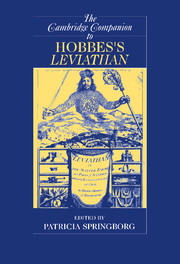Book contents
- Frontmatter
- General Introduction
- Part I: Of Man
- Part II: Of Commonwealth
- Part III: Of a Christian Commonwealth
- Part IV: Of the Kingdom of Darkness
- 14 Hobbes’s Critique of the Doctrine of Essences and Its Sources
- 15 Leviathan and Its Anglican Context
- 16 The Bible and Protestantism in Leviathan
- 17 The 1668 Appendix and Hobbes’s Theological Project
- Part V: Hobbes’s Reception
- Bibliography
- Index
- Series List
14 - Hobbes’s Critique of the Doctrine of Essences and Its Sources
from Part IV: - Of the Kingdom of Darkness
Published online by Cambridge University Press: 28 November 2007
- Frontmatter
- General Introduction
- Part I: Of Man
- Part II: Of Commonwealth
- Part III: Of a Christian Commonwealth
- Part IV: Of the Kingdom of Darkness
- 14 Hobbes’s Critique of the Doctrine of Essences and Its Sources
- 15 Leviathan and Its Anglican Context
- 16 The Bible and Protestantism in Leviathan
- 17 The 1668 Appendix and Hobbes’s Theological Project
- Part V: Hobbes’s Reception
- Bibliography
- Index
- Series List
Summary
HOBBES’S CRITIQUE OF ARISTOTLE’S METAPHYSICS
In the Appendix to the Latin Leviathan published in 1668, Hobbes undertook a laborious interpretation of the Nicene Creed to show that his philosophy was not contrary to the 'orthodox' doctrine of the Church as defined by the first four Ecumenical Councils. He also tried to demonstrate that, while meeting the criteria for proper rationality, it also corresponded more closely to the literal meaning of Holy Scripture. In what amounted to an exegetical and philosophical tour de force, Hobbes confronted a series of terms that had served to define theological doctrine but that also had a specific philosophical emphasis: the concepts hypostasis, essence, substance and entity. In order to define the meanings of these terms and the reciprocal relationships between them he was obliged to take a strong position on their thousand year history in metaphysics and theology; we must therefore admire the courage with which he tackled this problem. The passage in question concerns in particular the doctrine of essences and the presumed 'separate' existence of essences. Hobbes argues that the problem of abstraction is a semantic problem: 'abstracts are the problem of abstractions when they are thought of separately from the other names of the same object'.
- Type
- Chapter
- Information
- The Cambridge Companion to Hobbes's Leviathan , pp. 337 - 357Publisher: Cambridge University PressPrint publication year: 2007
- 7
- Cited by



